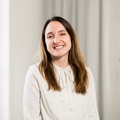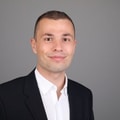"How do I want to live my life within the system? What is my role?" Looking back on a year full of highlights and challenges for an SDG Youth Programme trainee
Luc Bitterli participated in the first cohort of the SDG Youth Programme. As an intern at Swisscontact, he gained work experience in international cooperation in Switzerland and Bangladesh.
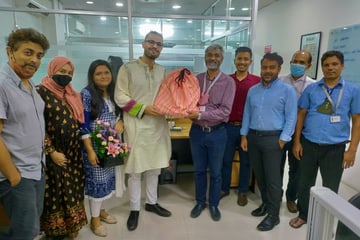
Luc Bitterli was chosen to participate in the SDG Youth Programme in 2021. He was recruited as a trainee for Swisscontact to work with the Microinsurance Market Systems Development for Agriculture & Livestock in Bangladesh.
In this interview, Luc looks back and talks about the biggest highlights and challenges he had to overcome during the last year. He also shares his future career plans after completing the programme.
Learn more about the programme
What was your biggest highlight?
Looking back at my time in Bangladesh, the highlight was undoubtedly the people I got to know. So many people with diverse experiences and vast knowledge, people with dreams and hopes. They made me feel very welcome. They made me laugh, think, learn and better understand things. They made me curious; they made me cry and also frustrated me. They simply made a big impression on me.
Looking back, my highlight was certainly the people I got to know during my time in Bangladesh. So many people with diverse experiences and vast knowledge, people with dreams and hopes.
I could laugh with them as we ate fondue and raclette in non-Swiss temperatures of around 40 degrees and humidity of almost 100%. They made me learn and understand when they invited me to their “holud” and wedding ceremony or their “iftar” at their homes. They made me cry when they told me about their fate – be it Rana Plaza survivors or climate migrants. The same people made me smile when they voiced their hopes and visions. And they made me frustrated at the system of which I am a part. Frustrated and quite helpless in facing the scale of the system. And they impressed me greatly by standing up against the system despite fearing for their freedom, well-being and even their lives.
Yes, in summary, I am convinced that all these people together were the highlight. These people not only helped me learn enormously about their country and the global system but also about myself. How do I want to live my life within the system? What is my role?
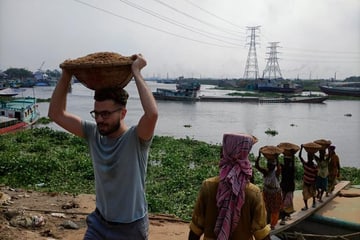
What was your greatest challenge?
If I were to say that my health was a great challenge, that would probably not be a lie. The University Hospital Basel, REGA, the Swiss Tropical and Public Health Institute, my health insurance, Swisscontact’s travel department as well as the head of security in Bangladesh would probably agree with me – I kept them pretty busy. But my illness, which lasted several months, including a flight home and two hospital stays, was still not the greatest challenge in my time in Bangladesh, nor in my time since then.
But my illness, which lasted several months, including a flight home and two hospital stays, was still not the greatest challenge in my time in Bangladesh and since then.
My greatest challenge, which I have not yet overcome (and probably never will), is how to position myself in a global system that seems to be too dominant for me as an individual to influence significantly. It is a system where environmental destruction, extreme inequalities, and vulnerabilities to crisis are not a result, but rather a feature. A system deeply rooted in colonialism and based on an exploitative extraction of resources. A system whose rules and practices discriminate against people along multiple lines, be it gender, age, ethnicity, or other characteristics. It’s not that I haven’t intensively questioned myself about this challenge before. It’s just that, as a privileged person from the Global North, I have spent most of my life in a part of the system that benefits from it. That is why the challenge is not to appreciate what I already have (I am clearly very aware of that) but how I can contribute to shaping a more inclusive system.
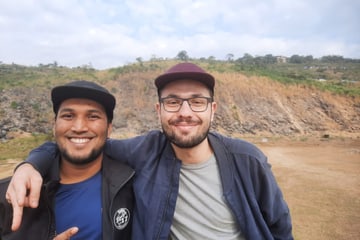
What are your plans after the programme?
When telling friends and family about the microinsurance project that I was privileged to work on in Bangladesh, I often received the same question: “did it work?” The more I have received this question, the more I have asked myself what people mean when they talk about development. And I found myself not being able to explain what development is exactly.
I found myself not being able to explain what development is exactly.
Development is both the goal and the means. Development is not only the intentional activities of international agencies to bring about change but also the steady process of social and economic transformation. Development includes local activists committing their lives to better working conditions for ready-made garment workers. Development includes programmes, policies, and projects. Is development the expansion of freedom, economic growth, or industrialisation? Development happens and is shaped by development. Development is complex, challenging and global. And it fascinates me a lot.
To understand how to best position myself in development, I have to understand what development actually is. With the privilege of being awarded a scholarship, I am now studying Development Studies at the London School of Economics (LSE).

